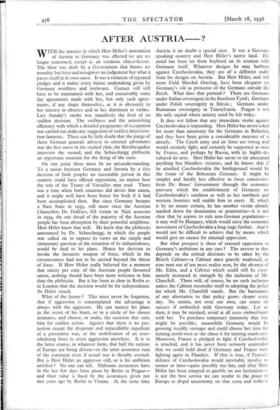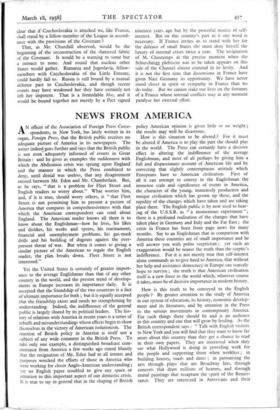AFTER AUSTRIA
WITH the manner in which Herr Hitler's annexation of Austria to Germany was effected we are no longer concerned, except as an ominous object-lesson. The blow was dealt by a Government that knows no morality but force and recognises no judgement but what it passes itself in its own cause. It was a violation of repeated pledges and it makes every future undertaking given by Germany worthless and irrelevant. Contact will still have to be maintained with her, and conceivably some day agreements made with her, but only such agree- ments, if any shape themselves, as it is obviously to her interest to observe and to her detriment to violate. Last Sunday's stroke was manifestly the fruit of no, sudden decision. The swiftness and the astonishing efficiency with which a detailed programme of occupation was carried out make any suggestion of sudden improvisa- tion fantastic. There can be little doubt that the purge of those German generals adverse to external adventures was the first move in the studied plan, the Berchtesgaden interview the second, and the Schuschnigg plebiscite an opportune occasion for the firing of the train.
On one point there must be no misunderstanding. To a union between Germany and Austria by a free decision of both peoples no reasonable person in this country could have offered opposition, no matter how the text of the Treaty of Versailles may read. There was a time when both countries did desire that union, and it might well have been better for both if it had been accomplished then. But since Germany became a Nazi State in 1933, still more since the Austrian Chancellor, Dr. Dollfuss, fell victim to Nazi assassins in 1934, the one dread of the majority of the Austrian people has been absorption by their powerful neighbour. Herr Hider knew that well. He knew that the plebiscite announced by Dr. Schuschnigg, in which the people was called on to express its views on the simple and elementary question of the retention of its independence, would be fatal to his plans. Hence his decision to invoke the favourite weapon of force, which in the circumstances had not to be carried beyond the threat of force. If Herr Hitler really believed for a moment that ninety per cent. of the Austrian people favoured union, nothing should have been more welcome to him than the plebiscite. But it has been as clear in Berlin as in London that the decision would be for independence. So Hider struck.
What of the future ? This must never be forgotten, that if aggression is contemplated the advantage is always with the aggressor. He can mature his plans in the secret of his heart, or in a circle of his closest intimates, and choose, or make, the occasion that suits him for sudden action. Against that there is no pro- tection except the desperate and unjustifiable expedient of a preventive war, or the mobilisation of an over- whelming force to resist aggression anywhere. It is to the latter course, in whatever form, that half the nations of Europe are being driven—to the utter economic ruin of the continent even if actual war is thereby averted. But is Herr Hider an aggressor still, or is his ambition satisfied ? No one can tell. Elaborate assurances have in the last few days been given by Berlin to Prague— and their value is fixed by the assurances given not two years ago by Berlin to Vienna. • At the same time Austria is no doubt a special case. It was a German- speaking country and Herr Hider's native land. His mind has been set from boyhood on its reunion with Germany itself. Whatever designs he may harbour against Czechoslovakia, they are of a different order from his designs on Austria. But Herr Hitler, and still more Field Marshal Goering, have been eloquent on Germany's role as protector of the Germans outside the Reich. What does that portend ? There are Germans under Italian sovereignty in the Southern Tyrol ; Germans under Polish sovereignty in Silesia ; Germans under Rumanian sovereignty in Transylvania. Prague is not the only capital where anxiety need be felt today.
It does not follow that any immediate stroke against Czechoslovakia is impending. Herr Hider has never asked for more than autonomy for the Germans in Bohemia, and they have been given a considerable measure of it already. The Czech army and air force are strong and would certainly fight, and certainly be supported at once by France, and perhaps by Russia, with its highly-de- veloped air-arm. Herr Hider has never so far attempted anything but bloodless victories, and he knows that if he attacked Czechoslovakia the battleground would be the home of the Bohemian Germans. It might be simpler and hardly less effective to force concessions from Dr. Benes' Government through the economic pressure which the establishment of Germany on Czechoslovakia's southern as well as her northern and western frontiers will enable him to exert. If, which is by no means certain, he has another victim already marked down for domination or penetration—it is not clear that he aspires to rule non-German populations— it may well be Hungary, which would carry the economic investment of Czechoslovakia a long stage further. And it would not be difficult to achieve that by means which would give no excuse for external opposition..
But what prospect is there of external opposition to Germany's ambitions in any case ? The answer to that depends on the critical decisions to be taken by the British Cabinet—a Cabinet most gravely weakened, as nine men out of ten must realise now, by the absence of Mr. Eden, and a Cabinet which could still be enor- mously increased in strength by the inclusion of Mr. Churchill. There will, of course, be no such inclusion unless the Cabinet reconciles itself to adopting the policy for which Mr. Churchill stands. But the barrenness of any alternative to that policy grows clearer every day. No nation, not even our own, can count on success if embroiled with Germany today. Let us then, it may be rejoined, avoid at all costs embroilment with her. To purchase temporary immunity that way might be possible; meanwhile Germany would be growing steadily stronger and could choose her time for turning north-west as she chose it for turning south-east. Moreover, France is pledged to fight if Czechoslovakia is attacked, and it has never been seriously contended that we could hold aloof if Germany and France were fighting again in Flanders. If that is true, if France's defence of Czechoslovakia would inevitably involve us sooner or later—quite possibly too late, and after Herr Hitler has been tempted to gamble on our hesitations— is not the best service we can render to the peace of Europe to dispel uncertainty on that score and make it clear that if Czechoslovakia is attacked we, like France, shall stand by a fellow-member of the League in accord- ance with the provisions of the Covenant ?
That, as Mr. Churchill observed, would be the beginning of the reconstruction of the shattered fabric of the Covenant. It would be a warning to some but a menace to none. And round that nucleus other States would gather. Rumania and Jugoslavia, fellow- members with Czechoslovakia of the Little Entente, could hardly fail to. Russia is still bound by a mutual defence pact to Czechoslovakia, and though recent events may have weakened her they have certainly not left her impotent. That is a formidable bloc, and it would be bound together not merely by a Pact signed nineteen years ago but by the powerful motive of self- interest. But on this country's part in it one word is necessary. If France invites us to stand with her for the defence of small States she must deny herself the luxury of internal crises twice a year. The resignation of M. Chautemps at the precise moment when the Schuschnigg plebiscite was to be taken appears on this side of the Channel almost criminal in its levity. And it is not the first time that dissensions in France have given Nazi Germany its opportunity. We have never stood closer in spirit or sympathy to France than we do today. But we cannot stake our lives on the fortunes of a France whose internal conflicts may at any moment paralyse her external effort.















































 Previous page
Previous page